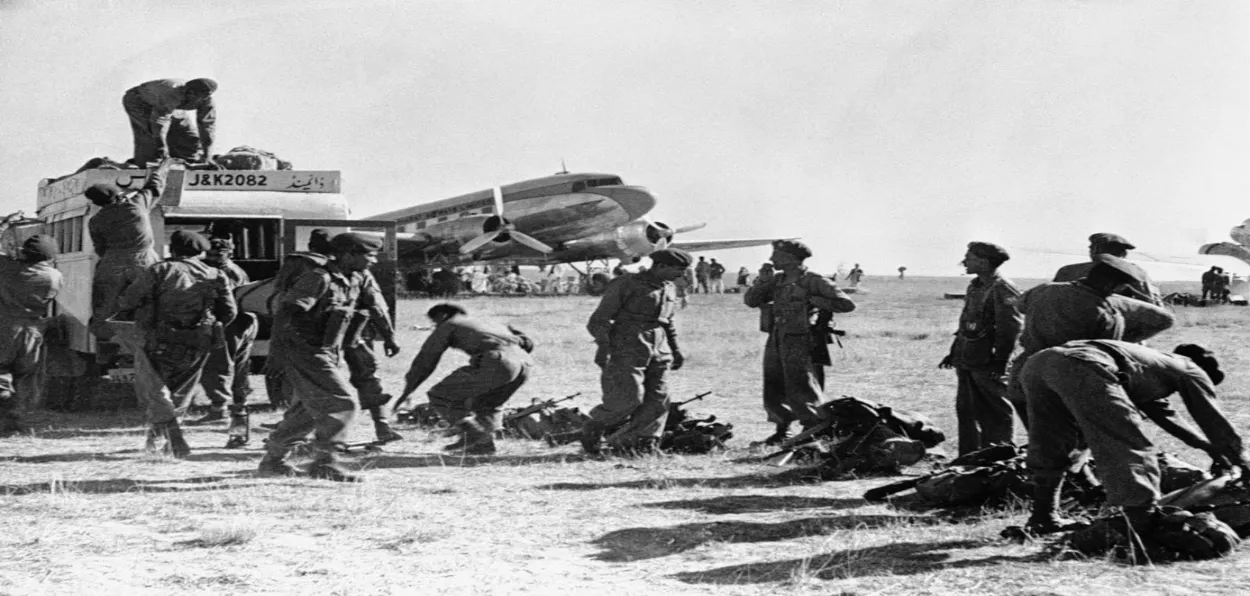
Saquib Salim
“The atmosphere reminded one of Spain and the International Brigade where, it was said, writers had come to live their books, and poets had come to die for their poetry!” Khwaja Ahmad Abbas, writer and filmmaker, had this to say about the resistance force created by the Indian intellectuals during the 1947-48 invasion of Kashmir by Pakistan. Abbas was one of the many writers, artists and creative persons who went to Kashmir to help the Indian Army at the height of the war between India and the newly formed Pakistan.
In his autobiography, Abbas writes that when Pakistan invaded Kashmir in 1947 and India sent troops to resist the invasion after Maharaja Hari Singh signed the instrument of accession, he went straight to Jawaharlal Nehru and said, “I want to go to Kashmir.” When Nehru refused to permit him, Abbas told him that already several progressive writers and artists had reached Kashmir, and there was no reason why he should not be there with them.
The permission was granted, and Rafi Ahmad Kidwai gave him a chit which said “Khwaja Ahmad Abbas — one seat to Srinagar”. The next morning at 6 a.m., Abbas sat in a Dakota aeroplane from Safdarjung Airport in Delhi. He was surprised to see that the plane had no seats, and he had to sit on sacks of food grains meant for Kashmiris. Another shock was awaiting Abbas. The man sitting on another sack of foodgrain was General Cariappa. An astonished Abbas asked, “You mean, Sir, they can’t even provide a plane for an officer of your rank?”
Cariappa replied, “The rice and ata come first”. He also said, “I am a fellow passenger with you, sitting on these sacks of ata, or is it rice, which means life and death to the people of Kashmir.”
At the Srinagar airport, he was received by D. P. Dhar, former leader of the Students Federation in Lucknow and a friend of Ali Sardar Jafri. Dhar was Deputy Home Minister in the Sheikh Abdullah-led provisional government at that time and was “doing a dozen things — from training Kashmiri boatmen and farmers into a militia to keeping track of the infiltrators who were still prowling about the valley, and looking after the intellectuals who were coming in every day.”
Dhar took Abbas to a guest house where a few intellectuals were already there. Among them was Ramanand Sagar, Urdu writer and filmmaker, who had migrated from the Pakistani side a few days back and left his family in Delhi to fight this war.
Abbas later recalled that this room had at least 20 artists, writers, poets and journalists from all over India. Hindus, Muslims and Sikhs were among them. He compared this group of intellectuals to a ray of hope in times of darkness. Rajinder Singh Bedi, Mrs Chandrakiran Sonrexa, Navtej Singh, Sher Singh, and Raj Bans Khanna were other prominent people present there. About the whole situation, Abbas later wrote, “I was reminded of Spain where young intellectuals were also drafted into ministerial positions and went about carrying rifles, at the time during the heroic (but, alas, hopeless) struggle against fascism!”
These intellectuals joined the actual war. Abbas wrote about his own visit to Uri. “We were presumably sighted by the Pakistanis through their held glasses for two mortar shells that fell dangerously close to us. This was a real war, and we could have all died there and then, as Brigadier Usman was to die in another sector, the most important Muslim to lay down his life for secularism and Kashmir. Yet, I was not afraid of death in that moment. Was it because of the company I had, Marg-e-Amboh jashn na darad (When you die in a group, there is no celebration!) — or was it some sort of contagion of bravery?”
READ MORE: Nuruddin Ahmed sculpts Zubeen Garg’s statue to pay tributes to legendary singer
Abbas wrote that when he came to Srinagar, he saw darkness around India’s future, but with this room full of intellectuals at Srinagar, he had witnessed the light that would overcome the gloom.
